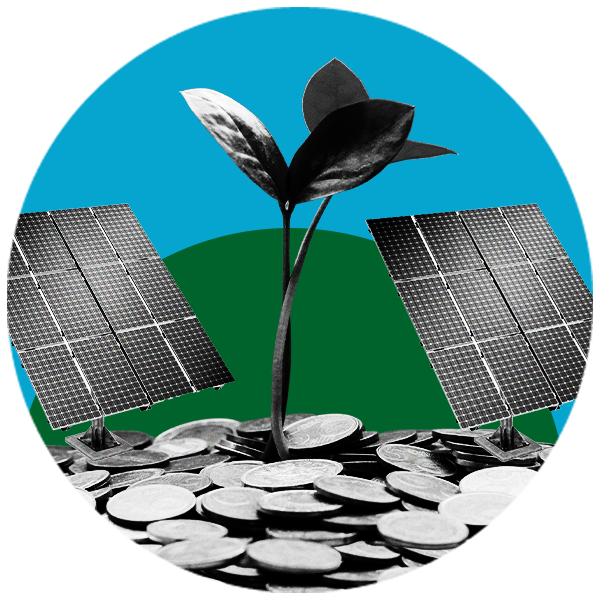Five ways to jump-start the renewable energy transition

Solar power can be stored in batteries and released when needed. Image: Unsplash/American Public Power Association
- UN Secretary-General António Guterres has set out five critical actions the world needs to speed up the shift to renewable energy.
- This includes removing intellectual property rights barriers and shifting subsidies from fossil fuels to renewable energy.
- His comments come as greenhouse gas concentrations, sea level rise, ocean heat and ocean acidification all hit record highs in 2021.
Four key climate change indicators – greenhouse gas concentrations, sea level rise, ocean heat and ocean acidification – set new records in 2021. This is yet another clear sign that human activities are causing planetary-scale changes on land, in the ocean, and in the atmosphere, with dramatic and long-lasting ramifications.
The key to tackling this crisis is to end our reliance on energy generated from fossil fuels - the main cause of climate change.
“The good news is that the lifeline is right in front of us,” says UN Secretary-General António Guterres, stressing that renewable energy technologies like wind and solar already exist today, and in most cases, are cheaper than coal and other fossil fuels. We now need to put them to work, urgently, at scale and speed.
The Secretary-General outlines five critical actions the world needs to prioritize now to transform our energy systems and speed up the shift to renewable energy - “because without renewables, there can be no future.”
Make renewable energy technology a global public good
For renewable energy technology to be a global public good - meaning available to all, and not just to the wealthy - it will be essential to remove roadblocks to knowledge sharing and technological transfer, including intellectual property rights barriers.
Essential technologies such as battery storage systems allow energy from renewables, like solar and wind, to be stored and released when people, communities and businesses need power. They help to increase energy system flexibility due to their unique capability to quickly absorb, hold and re-inject electricity, says the International Renewable Energy Agency.
Moreover, when paired with renewable generators, battery storage technologies can provide reliable and cheaper electricity in isolated grids and to off-grid communities in remote locations.

Improve global access to components and raw materials
A robust supply of renewable energy components and raw materials is essential. More widespread access to all the key components and materials - from the minerals needed to produce wind turbines and electricity networks, to electric vehicles - will be key.
It will take significant international coordination to expand and diversify manufacturing capacity globally. Moreover, greater investments are needed to ensure a just transition - including in people’s skills training, research and innovation, and incentives to build supply chains through sustainable practices that protect ecosystems and cultures.

Level the playing field for renewable energy technologies
While global cooperation and coordination is critical, domestic policy frameworks must urgently be reformed to streamline and fast-track renewable energy projects and catalyze private sector investments.
Technology, capacity and funds for renewable energy transition exist, but there needs to be policies and processes in place to reduce market risk and enable and incentivize investments - including through streamlining the planning, permitting and regulatory processes, and preventing bottlenecks and red tape. This could include allocating space to enable large-scale build-outs in special Renewable Energy Zones.
Nationally Determined Contributions, countries’ individual climate action plans to cut emissions and adapt to climate impacts, must set 1.5C aligned renewable energy targets - and the share of renewables in global electricity generation must increase from today’s 29 percent to 60 percent by 2030.
Clear and robust policies, transparent processes, public support and the availability of modern energy transmission systems are key to accelerating the uptake of wind and solar energy technologies.

What's the World Economic Forum doing about the transition to clean energy?
Shift energy subsidies from fossil fuels to renewable energy
Fossil-fuel subsidies are one of the biggest financial barriers hampering the world’s shift to renewable energy. The International Monetary Fund (IMF) says that about $5.9 trillion was spent on subsidizing the fossil fuel industry in 2020 alone, including through explicit subsidies, tax breaks, and health and environmental damages that were not priced into the cost of fossil fuels. That’s roughly $11 billion a day.
Fossil fuel subsidies are both inefficient and inequitable. Across developing countries, about half of the public resources spent to support fossil fuel consumption benefits the richest 20 percent of the population, according to the IMF.
Shifting subsidies from fossil fuels to renewable energy not only cuts emissions, it also contributes to the sustainable economic growth, job creation, better public health and more equality, particularly for the poor and most vulnerable communities around the world.

Triple investments in renewables
At least $4 trillion a year needs to be invested in renewable energy until 2030 – including investments in technology and infrastructure – to allow us to reach net-zero emissions by 2050.
Not nearly as high as yearly fossil fuel subsidies, this investment will pay off. The reduction of pollution and climate impact alone could save the world up to $4.2 trillion per year by 2030.
The funding is there - what is needed is commitment and accountability, particularly from the global financial systems, including multilateral development banks and other public and private financial institutions, that must align their lending portfolios towards accelerating the renewable energy transition.
In the Secretary-General’s words, “renewables are the only path to real energy security, stable power prices and sustainable employment opportunities.”
Don't miss any update on this topic
Create a free account and access your personalized content collection with our latest publications and analyses.
License and Republishing
World Economic Forum articles may be republished in accordance with the Creative Commons Attribution-NonCommercial-NoDerivatives 4.0 International Public License, and in accordance with our Terms of Use.
The views expressed in this article are those of the author alone and not the World Economic Forum.
Stay up to date:
SDG 13: Climate Action
Forum Stories newsletter
Bringing you weekly curated insights and analysis on the global issues that matter.
More on Energy TransitionSee all
Roberto Bocca
November 17, 2025








